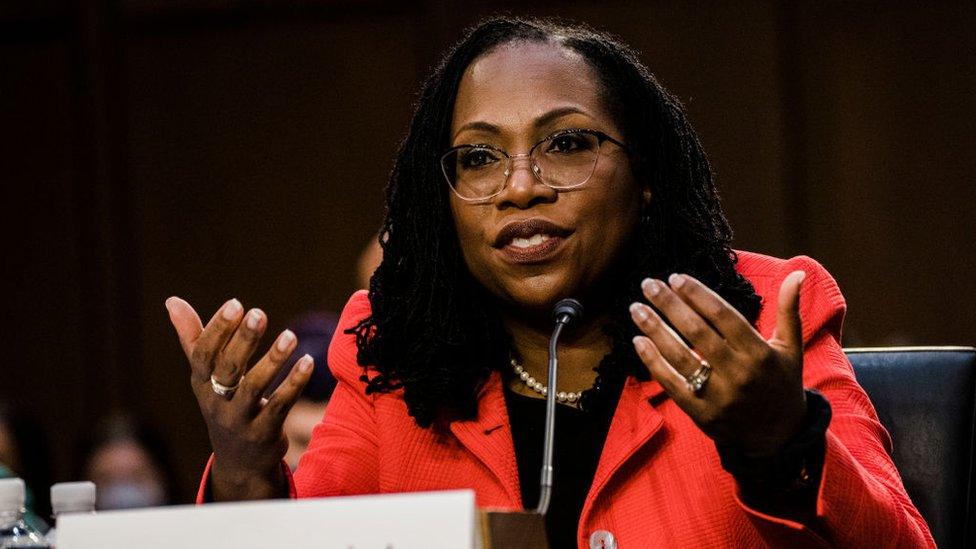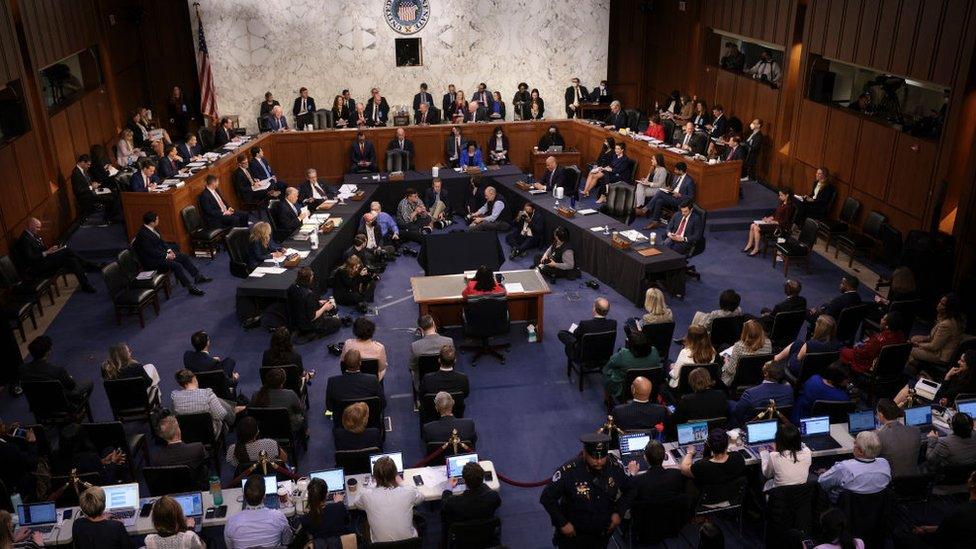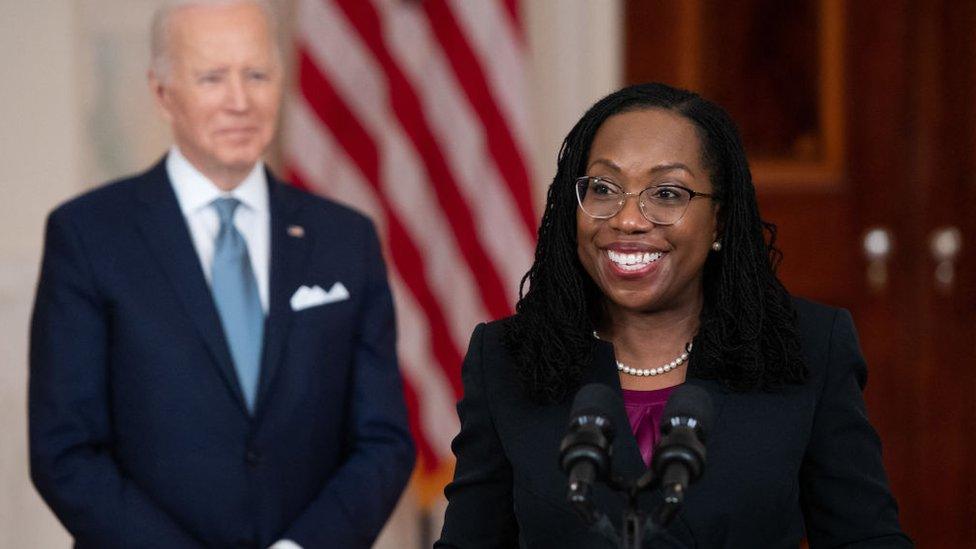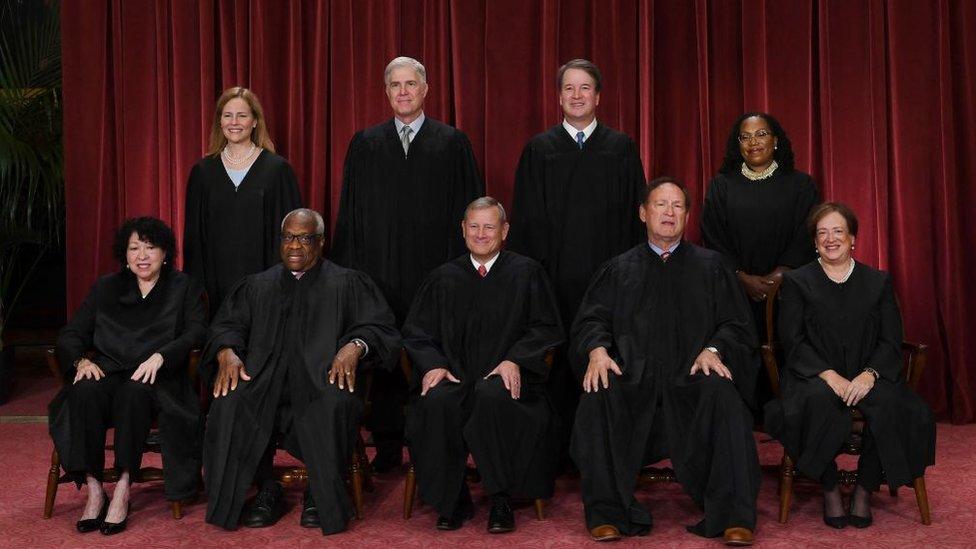Ketanji Brown Jackson: Key moments as Biden's Supreme Court pick quizzed
- Published

Ketanji Brown Jackson
US President Joe Biden's Supreme Court pick is taking questions on her career and record from lawmakers on a key Senate panel over the next two days.
If the 22-member Judiciary Committee advances Ketanji Brown Jackson's nomination, she will be considered by a vote of the full 100-member Senate.
If confirmed, she would replace liberal Justice Stephen Breyer when he retires at the end of the court term in June.
So the political balance of the court would remain largely the same.
But it would be history-making because Ms Jackson would be the first black woman in the court's 233-year existence.
Here is a look at the key moments so far, with analysis by our political correspondent Anthony Zurcher.
Jackson's judicial philosophy
What happened: Several Republicans have focused on how Ms Jackson views and interprets the law. Some question if she is an "activist judge" imposing her policy views or preference from the bench.
The judge replied that she is "acutely aware" of the limits on her judicial authority and has a three-step methodology to keep herself in check. "I am trying in every case to stay in my lane," she said.
Democrats argue Ms Jackson's record is well-established through over 500 legal opinions and because she has been confirmed in the Senate on three prior occasions.
What it means: Politicians of all stripes like to complain about "activist" judges who pursue their own agendas. Of course, judges are only improperly activist when they're ruling in ways that the politicians don't like. When asked about her judicial philosophy, Ms Jackson emphasised neutrality and restraint as key components of her judicial philosophy. That was her way of defusing Republican criticism that she will defend liberal priorities on the court (even if that's exactly what most Democrats hope, and expect, she will do). By Anthony Zurcher
Representing Guantanamo detainees
What happened: Some lawmakers on the committee have raised concerns she provided "free legal services to help terrorists get out" of the notorious facility.
In response, she said public defenders are assigned cases and do not choose who to represent, often helping those who cannot afford a lawyer. And all defendants are "entitled to representation and being treated fairly" under the US justice system.
Texas Republican John Cornyn asked Ms Jackson why she named former President George W Bush and former Defence Secretary Donald Rumsfeld "war criminals" in a court filing on behalf of one client.
"Why would you do something like that? It seems so out of character," he said. Ms Jackson said she needed to review the document but "didn't intend to disparage" them.
What it means: Jackson explained her work defending terrorism suspects at Guantanamo Bay as an effort to protect something greater - the US Constitution. In a line that should be familiar to anyone who lived through the early 2000s, she said not abiding by constitutional protections "would let the terrorists win". Under questioning by South Carolina Senator Lindsey Graham, however, she acknowledged that defending detainees meant, at times, helping to release individuals who then worked against US interests. Mr Graham, it seemed, was not impressed. "As long as they're dangerous, I hope they all die in jail if they're going to go back and kill Americans," he said before he walked out of the hearing room. By Anthony Zurcher
Critical race theory
What happened: Texas lawmaker Ted Cruz pressed the nominee on her views of critical race theory (CRT), a framework for understanding the way systemic racism can perpetuate discrimination and disadvantage.
CRT has become a topic of fierce political debate in the US, as parents, teachers and school administrators grapple with how to teach race, discrimination and inequality in the classroom. Conservatives argue CRT teachings are intended to create guilt in white people.
But Ms Jackson said: "I've never studied critical race theory, and I've never used it. It doesn't come up in my work as a judge."
She acknowledged related academic theories are often taught in law school.
What it means: It was show and tell time at Ms Jackson's confirmation hearings, as Ted Cruz unveiled poster boards of children's book pages that, he said, inform white children they are inherently racist. That may have little to do with critical race theory as an academic concept, but it lies at the heart of a key conservative talking point in recent months. It's one that many Republicans see as electoral gold. A chance to bring up the topic - and force Ms Jackson, the first black woman nominee to the Supreme Court, to disavow such books - was exactly what the Texas senator with presidential ambitions wanted.
Adding more justices to the court
What happened: With the Supreme Court recently consolidating a 6-3 conservative majority, liberal politicians and activists have suggested adding seats to the top court.
Democrats argue it could restore the court's damaged credibility, but Republicans have slammed the proposal as a means of installing more liberal justices to the court. Sitting Supreme Court justices have also spoken out against the idea.
Asked about the issue on Tuesday, Ms Jackson deflected: "Judges should not be speaking to political issues. It is a policy question for Congress."
What it means: It might seem like Ms Jackson is interviewing for a truck-driving job, not a seat on the Supreme Court, the number of times she was intent on "staying in her lane". That was her canned response to any attempt by senators to get her to weigh in on what she viewed as political issues. Adding seats to the Supreme Court was just such an instance. Democrats may love the idea of putting more liberal-leaning justices on the court, and Ms Jackson might enjoy the company, but she isn't going to say so under committee questioning, when such answer would quickly be used by Republicans to energise their voters in upcoming elections. By Anthony Zurcher

Each senator had 30 minutes on Tuesday to question Ms Jackson
'Anti-law enforcement'
What happened: Judge Jackson's time as a public defender has opened her up to attacks from Republicans that she was "soft on crime".
But she countered by saying her experiences on both sides of the criminal justice system are an "asset" and have made her a better lawyer. She also points to her family connections - her brother is a police officer in Baltimore, Maryland, while her uncle was once chief of police in Miami, Florida.
"Crime and the need for law enforcement are not abstract concepts or political slogans to me."
What it means: At times this has felt more like arranging political strategy for November's mid-term congressional elections than confirming a Supreme Court justice. Republican candidates are already hitting Democrats for being "soft on crime" and placing blame for rising violent crime rates at President Joe Biden's feet. Conservatives want to advance Brown Jackson's record as a public defender, as well as her rulings during criminal trials, as evidence that liberals sympathise with the accused over the victims - a perception the nominee is making efforts to dispel. By Anthony Zurcher
Prosecuting child porn offenders
What happened: Senator Dick Durbin asked Ms Jackson about claims by his colleague Josh Hawley that she "has a pattern of letting child porn offenders off the hook".
The Missouri Republican had argued she handed down lenient penalties as a judge and advocated for lowering penalties as vice chair of the US Sentencing Commission, which advises Congress on federal sentencing guidelines.
The claims are misleading, according to several fact-checkers. One conservative writer has called them "meritless to the point of demagoguery". For her part, Ms Jackson - a mother of two - said: "Nothing could be further from the truth."
What it means: Jackson has tried to deflect these Republican accusations with a bit of rhetorical jujitsu. Instead of defending her sentences (which were at times below the congressionally issued guidelines but not out of step with other judges), she spoke of the harm done by sex offenders. She spoke of the lives that had been shattered and outlined the full range of punishment offenders received through her rulings. Her goal was to speak for the victims, not defend the accused. By Anthony Zurcher
Related topics
- Published21 March 2022

- Published8 February 2024

- Published5 October 2021